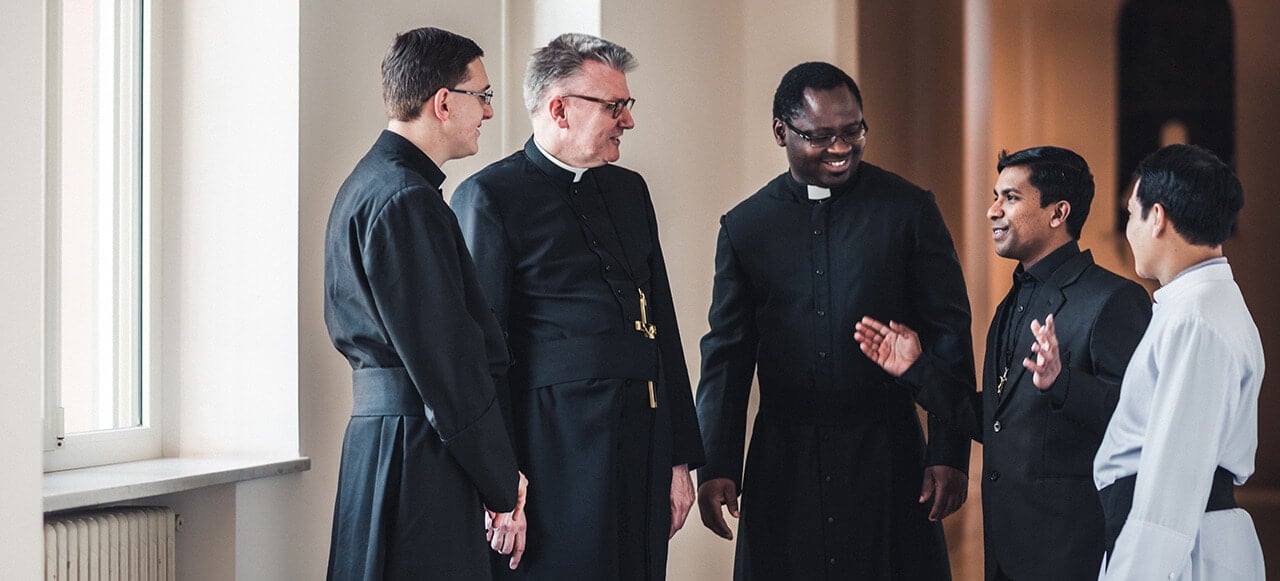It is rather rare for a priest to celebrate seventy years of religious life. To cite some examples, just from the Congregation of the Oblates of Mary Immaculate, we have Frs. Damase Dandurand and Jean-Baptist Beys. The first died at the age of one hundred and two, after eighty years of priesthood. As for Fr. Beys, who died in Nice in 1976, he had a long career of eighty-one years in community life and seventy-six of priesthood. The people of the James Bay and Maniwaki also remember Fr. Joseph-Etienne Guinard, that sympathetic centenarian who died piously in Sainte-Agathe-des-Monts in 1965, crowning seventy-three beautiful years of service as a priest.
What is rarer still and probably unique in the history of religious communities, in Canada as well as in Europe, is to see a seventy-eight year old novice! Well, the Oblates hold this record, if there are records! This novice was an Irishman. He was William Daly. Born on October 17, 1814, in Newtownbarry, Wexford County, the young William felt himself attracted early on to work for the conversion of the pagans. Some foreign priests from Dublin told him of the existence of a religious congregation in Marseilles that was going to send missionaries abroad. This information struck young Daly. So, he went to Marseilles and met Bishop Charles-Joseph Eugene de Mazenod, founder of the Oblates of Mary Immaculate. He took the habit on February 16, 1837.
Four years later, this young priest arrived in England. Together with Fr. Casimir Aubert, he worked actively to establish the Oblates in this country. He founded several missions and devoted himself successfully to the evangelization of the poor in the working class areas. He was also instrumental in getting several good English-speaking recruits for his community. Unfortunately, he proved to be of an unforgivable imprudence in a financial transaction concerning a property in Ashbourne and the parish of Penzance. This serious error placed the Congregation on the doorstep of bankruptcy. Bishop de Mazenod immediately delegated Fr. Casimir Aubert, who was in England, to do everything possible to limit the damage. “Nip this unfortunate business in the bud,” he wrote to him. “It is a pure madness! But do not forget, the shorter the madness the better.” Despite all of Fr. Aubert’s efforts, no arrangement was possible with the creditor, who knew how to benefit from the inconceivable naiveté of Fr. Daly so as to catch him in an impasse. This situation, which became known to the public in the newspapers, compromised seriously the credibility of the poor Father with the authorities of the Congregation. It consequently led to his departure, with the assent of the Founder. This last, even with the great pain of losing a beloved son, could express all the same, in the circumstances, feelings of confidence in Divine Providence and deep faith in the future. “One would be unworthy to belong to God and the Church if one let oneself be laid low by tribulations with which the demon afflicts precisely those whom he fears the most. Be constant then and firm, with confidence in God redouble your prayers and your fervor and this evil will be set to naught by good.” (Letter to Fr. Aubert, December 6, 1850).
Thus, in 1852, Fr. Daly passed into the diocesan clergy. He continued his ministry, in Manchester initially, and later in various parishes of the diocese of Salford. His piety and zeal won him the regard of his parishioners everywhere. His departure did not prevent him from keeping a keen interest in the Oblates. He supported as much as he could the development of their work and their missionary undertakings. On several occasions he thought of asking for readmission to the Congregation. It was only forty years later that he decided to do so officially. The Superior General of the time, Fr. Joseph Fabre, readily permitted him to enter again religious life. Thus, at the beginning of the summer of 1892, the novitiate at Belmont House welcomed a young novice, seventy-eight years old. All those who lived with him that year could note how happy he was to be with the Oblates again. The Lord allowed him to prepare, by the observance of the religious practices, to beautifully crown his long career. He was accepted for oblation the following year. Two years later, July 27, 1894, he died peacefully, surrounded by his confreres who were moved and edified to hear his joy at dying as an Oblate of Mary Immaculate.
André DORVAL, OMI
